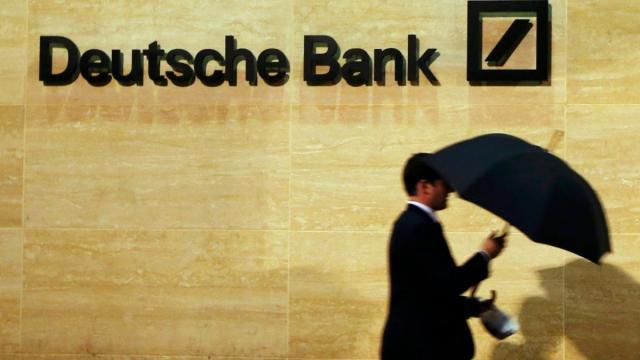
Germany’s Deutsche Bank has been fined a record $2.5 billion (£1.7 billion) for rigging the London Interbank Offered Rate, or Libor; ordered to fire seven employees; and accused of being obstructive towards regulators in their investigations into the global manipulation of the benchmark rate.
The penalties on Germany’s largest bank also involve a guilty plea to the Department of Justice (DoJ) in the U.S. and a deferred prosecution agreement. The regulators released a cache of emails, electronic messages and phone calls showing the attempts to move the rate used to price £3.5 trillion of financial contracts.
“I’m begging u pleassssssssssssssseeeeeeeeee I’m on my knees” is among the examples provided by regulators in hundreds of pages of detail accompanying the fine – the eighth related to rigging interest rates. Another trader, on learning a rate was unchanged, sent a message saying: “Oh bullshit.....strap on a pair and jack up the 3M (month). Hahahahaha.”
Georgina Philippou, the acting director of enforcement and market oversight at the Financial Conduct Authority, said the U.K.’s portion of the fine – £227 million – was a record for Libor because the bank had been misleading the regulator. The manipulation took place to generate profits and was pervasive, the FCA said.
“This case stands out for the seriousness and duration of the breaches by Deutsche Bank – something reflected in the size of today’s fine. One division at Deutsche Bank had a culture of generating profits without proper regard to the integrity of the market. This wasn’t limited to a few individuals but, on certain desks, it appeared deeply ingrained,” she said.
“Deutsche Bank’s failings were compounded by them repeatedly misleading us. The bank took far too long to produce vital documents and it moved far too slowly to fix relevant systems and controls,” said Philippou. The German bank had said on Wednesday that it would still remain profitable in the first quarter when it reports results next week before a major restructuring that could involve the bank pulling back from the high street.
For the first time in a Libor-rigging settlement, New York state’s Department of Financial Services (NYDFS) was involved and it ordered the bank to sack seven employees – one managing director, four directors and one vice-president, all based in London, together with one Frankfurt-based vice-president. The bank immediately took action to comply with this demand. In total 29 Deutsche employees were involved but the bank was unable to say how many staff had been sacked or disciplined as a result.
The NYDFS also said that Deutsche employees had coordinated their submission to the range of interest-rate benchmarks – also known as Euribor – with a number of banks including Barclays, BNP Paribas, Citibank, Merrill Lynch, Société Général and UBS.
Until now, fines have been levied by the FCA along with the DoJ and other regulators such as the US Commodity Futures Trading Commission (CFTC). The total of $2.5 billion includes $600m to the NYDFS, $800m to the CFTC and $775m to the DoJ. It covers the period 2005 to 2010.
“Deutsche Bank secretly conspired with its competitors to rig the benchmark interest rates at the heart of the global financial system,” said Bill Baer, an assistant attorney general at the DoJ. He said the bank’s misconduct “not only harmed its unsuspecting counterparties, it undermined the integrity and the competitiveness of financial markets everywhere”.
The bank had admitted within days of the first fine – on Barclays in June 2012 – that it was involved in rigging but it has taken until now for the investigation to be concluded.
The FCA said its work had been delayed because Deutsche Bank had failed to provide timely, accurate and complete information, erroneously deleted 482 tapes of telephone calls and claimed it could not hand over a report commissioned by the German regulator BaFin. A compliance officer had also signed confirmation in January 2011 that the bank’s Libor processes had been audited when this was not the case.
Libor involved a panel of banks sending submissions about the price they expected to be charged to borrow from rival banks across a range of currencies and time scales. This process has been changed since the scandal erupted in 2012.
The regulators found that Deutsche Bank had allowed its traders to also be responsible for the bank’s submissions to Libor, which made it easier to skew the positions. It continued to do this even after the British Bankers’ Association, the trade association which was then responsible for Libor, said this should not happen.
Deutsche, under pressure from shareholder to restructure the business, said no current or former member of the management board was found to have been involved in or aware of the trader misconduct. Anshu Jain, the co-chief executive, who used to run the investment bank, released a statement with his co-chief Jürgen Fitschen: “We deeply regret this matter but are pleased to have resolved it. The bank accepts the findings of the regulators.
“We have disciplined or dismissed individuals involved in the trader misconduct; have substantially strengthened our control teams, procedures and record-keeping; and are conducting a thorough review of the bank’s actions in addressing this matter,” they said.
“This agreement marks another step in addressing the past and ensuring that the bank earns back the trust of its clients, shareholders and society at large.”
3 WAYS TO SHOW YOUR SUPPORT
- Log in to post comments















